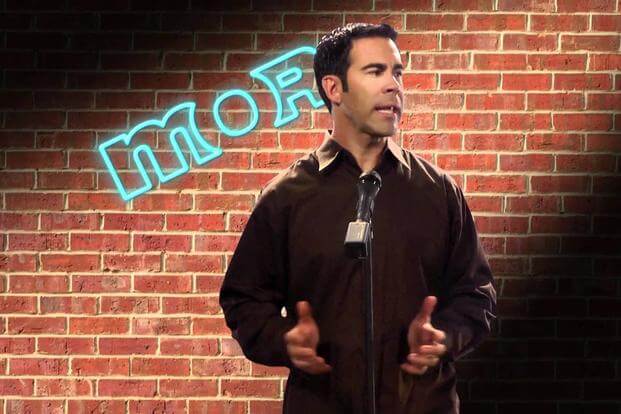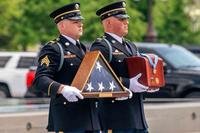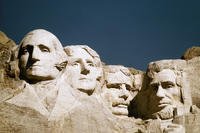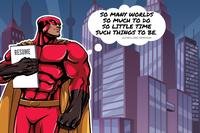You might say that Tim Wilkins was born for comedy. Even while he was earning the title of U.S. Marine, he "had the cockiness of a major," which led to him enduring more PT from drill instructors than he cares to remember.
Military.com's Sean Mclain Brown interviewed Wilkins about his unusual career trajectory and gained a peek inside the entertainment industry, as well as solid advice for anyone looking to break into Hollywood.
Q.: Why the Marines?
A.: "I'd wanted to serve, train and be connected to Team USA since I was a little kid playing soldier in the yard. I started community college and, in my first semester, found myself really bored. Around that same time, my friend, Dave, came home from boot camp, and you know the change you see in someone when that happens.
"That spurred a trip to the local recruiter, and my fate to be a Marine was sealed. If I was going to be in the military, I wanted to be the best at something for the first time in my life."
Q.: What did you do in the Marines?
A.: "I was trained as a field radio operator in Twentynine Palms after spending 12 glorious weeks at Hollywood boot camp, MCRD [Marine Corps Recruit Depot] San Diego. After MOS [military occupational specialty] school, I came home to return to college, and -- I hope it doesn't seem like a theme -- I was bored. I walked into the local recruiter's office and asked about being a part of the assistant program.
"After successfully inspiring a couple [of] people from my high school to join, the 30-day program was rolled over into the 189-day program, which was done again four more times. My biggest accomplishments didn't come in the form of ribbons or rank; I am really proud of the men and women I enlisted while on recruiting duty.
"There were quite a few with really distinguished careers who made huge contributions to the success and traditions of the Corps. One in particular, I had the honor of seeing a graduate from boot camp in MCRD and, 25 years later, watched his retirement from that same base as one of its commanding officers. My gift was finding far better Marines than I to fill those uniforms. For me, that was a low bar, like that tiny pull-up unit the Smurf privates used."
Q.: How did you go from the Marines to acting/comedy?
A.: "You have to know that there was always a comedian in that uniform, and I spent more than my share of time in the push-up position. My mouth had the cockiness of a major without the rank to back it up.
"As much as it had been my dream to be in the military, I've wanted to be a comedian since I was 6. Being a stand-up was in my sixth grade and high school yearbooks under life goals: "Be a comedian." Just after getting out of the reserves, I started doing open-mic nights, and one thing led to another. You'd actually be surprised how many Marine comedians there are."
Q.: What was your transition out of the Marine Corps and back into civilian life like?
A.: "The only time I had feelings of transition was just after boot camp. I went in on the buddy system with my best friend, David, and when we returned home, we were staying at his house. His mom came in to check on us the first morning home, and when she turned on the lights, we jumped to our feet, got dressed in seconds and reported for chow in the kitchen.
"It was an awkward few minutes as we both stood in the kitchen with plates in our hands waiting for some private to plop eggs down. As for real transition, there wasn't much since I was working in my hometown and not living the structured base life.
"The first 'pro' [about transition came when I] got my first actual job and was hired for my appearance. The managers where I was applying said to me that the fact my clothes were ironed, my hair was neatly cut and I was basically sitting at the position of attention compared to the rumpled, freshly minted college grads next to me told them everything they needed to know about my work ethic. The experience and resume stamp of USMC has continued to open doors.
"The 'cons' [about transition] continue to be my disappointment with civilian work ethic. Even though my time in the Corps was brief and happened 30 years ago, it taught me to take pride and responsibility in everything I do. I am constantly grateful when I can surround myself at work with other military go-getters and shake my head so much at the rest of the world that my neck muscles should look like Arnold Schwarzenegger's."
Q.: What skills did you learn in the Marines that helped you in your career as an entertainer?
A.: "As an entertainer, actor, car salesman ... I've even worked on the Home Shopping Network for the last seven years, and the same skills from the Marines keep coming into play -- the core values tags that we used to excite potential recruits. The confidence and discipline instilled from the Marines turned a skinny kid with a 'Kick Me' sign on his back into someone that can do anything.
"It turns out the same 'sales pitch' I fell for, that helped me convince a hundred other young bodies to sign up, was all true. All the stuff about Honor, Courage, Pride of Belonging, Self-Reliance ... those core values or Corps values become who you are, and that has helped me a lot more over the last 30 years than the military alphabet in [communications] school."
Q.: What inspires you? Who are some of your key influencers in your life and why?
A.: "If you were to equate life to boot camp right now, I'm near the end of second phase and trying to figure out what I'm going to do as a grown-up. The people that inspire me were and are the go-getters and motivators like my friends, Bill Parisi and Martin. They started out as trainers and each have gym franchise empires now that are changing thousands of lives every day. They speak and train people and get everyone who comes in contact with them fired up.
"The last few years, I've been really inspired by my military and civilian friends who are giving back. My friend, Rob Wilkins [retired USAF], does an amazing amount of work for veterans across many fronts. My workout buddy and celebrity chef, Robert Irvine, is traveling around the world training active-duty service members and raising money for the military. I love Gunny [R. Lee] Ermey, who is still helping wounded vets get houses on a new show.
"My latest venture is an organization called Laughs for the Troops, which has a mission of helping vets struggling with PTSD. We have shows, events and golf tournaments coming up soon. Other groups like Catch a Lift are outstanding. Their founder and the guys I've met make me wish I was retired and independently wealthy enough to help everyone who's ever served.
"And on any given day when I'm feeling tired or weak and can't find the motivation to drag my old butt in the gym, there's nothing like watching videos of some wounded jarhead outlift me with some psychotic music blasting in the background. Oorah!"
Q.: Fitness comedy? TV cooking? Corporate comedy? You seem to adapt yourself to almost any niche. How does that work for you?
A.: "Adapting and overcoming are lessons from the Marines, but so is following every dream and checking it off. I grew up watching cooking shows on TV. While hosting a morning talk show, we had time to fill, and it turned into two years on one channel and three years on another.
"Fitness comedy came from the workout bug that I picked up just before and during the Marine years, and wanting to connect my business with my interests was the inspiration of my comedy mentor, Carmen Ciricillo. About eight years into my stand-up career, he said that comedy was no different than any other business; if you have something you love and build the niche, you'll be successful. I've been emceeing bodybuilding shows and giving corporate wellness talks since 1998, just after he suggested it."
Q.: Why comedy? What is it about the art of performance that you enjoy so much?
A.: "There has always been something magical about making people laugh. You don't realize it as a kid, but crafting a word, a look, a sound effect or an impression enough to connect with what makes people happy is an unreal feeling. More and more, I love the feeling of creating new material, shaping it and making it work on stage. My favorite comedians are the ones who are constantly creating."
Q.: What are some of your current/future projects?
A.: "I'm still on HSN, and that keeps me really busy. I'm moving more into some acting projects and looking forward to more and more shows with Laughs for the Troops."
Q.: Have you met other military veterans in the entertainment industry? Is there a network you belong to of entertainment industry professionals who served in the military?
A.: "It's a blast to meet other veterans in the entertainment industry, but as a Marine, you know it's really special to connect with another one of 'us.' There's no network or industry trade group, but somehow we manage to smell out the other devil dogs. That usually leads to a crazy bond that lasts well past any project we work on."
Q.: What is your advice to those transitioning out of the military who might want to pursue a career in the entertainment industry?
A.: "The first thing I tell anyone transitioning out of the military is, don't underestimate your skills. We tend to think of ourselves as being limited to our MOS and not the deeper skills and values that make us who we are and not what we do.
"In entertainment, you have to hear no more often than in a marriage. You have to hurry up and wait and follow directions. Military people are uniquely qualified for this, so have no fear."
Find the Right Veteran Job
Whether you want to polish your resume, find veteran job fairs in your area or connect with employers looking to hire veterans, Military.com can help. Subscribe to Military.com to have job postings, guides and advice, and more delivered directly to your inbox.












